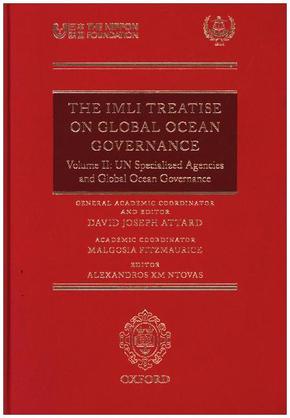The IMLI Treatise On Global Ocean Governance - Volume II: UN Specialized Agencies and Global Ocean Governance
| Verlag | Oxford University Press |
| Auflage | 2018 |
| Seiten | 434 |
| Format | 17,6 x 25,3 x 2,6 cm |
| Print PDF | |
| Gewicht | 891 g |
| Artikeltyp | Englisches Buch |
| ISBN-10 | 0198823967 |
| EAN | 9780198823964 |
| Bestell-Nr | 19882396EA |
The future of our oceans relies on an expansive legal framework. This second volume in a three part series considers autonomous organizations working inside the remit of the UN: are they ensuring sustainable development, are efforts adequately administrated, and how much co-ordination is there between different legal bodies?
The 1982 United Nations Convention on the Law of the Sea (UNCLOS) remains the cornerstone of global ocean governance. However, it lacks effective provisions or mechanisms to ensure that all ocean space and related problems are dealt with holistically. With seemingly no opportunity for revision due to the Conventions burdensome amendment provisions, complementary mechanisms dealing with such aspects of global ocean governance including maritime transport, fisheries, and marine environmental sustainability, have been developed under the aegis of the United Nations and other relevant international organizations. This approach is inherently fragmented and unable to achieve sustainable global ocean governance. In light of the Sustainable Development Goals (SDGs), particularly Goal 14, the IMLI Treatise proposes a new paradigm on the basis of integrated and cross-sectoral approach in order to realise a more effective and sustainable governance regime for the oceans.
This volume f ocuses on the role of the UN Specialized Agencies towards the development of effective and sustainable ocean governance by looking at the more elaborate mechanisms they developed in order to achieve the desired objectives laid down in UNCLOS. From FAO to UNODC, the volume examines how they ensure sustainable development and how much coordination exists among them.
Inhaltsverzeichnis:
Foreword, Harry N. Scheiber
A. Marine Living Resources and Marine Biodiversity
1: Tore Henriksen: FAO and Ocean Governance
2: Peter Ehlers: The Work of the UNESCO-IOC in Respect to Global Ocean Governance
3: Gerasimos Rodotheatos: The Work of the International Civil Aviation Organization in Respect to Global Ocean Governance
B. Commercial Aspects of the Marine Environment
4: Elizabeth A Kirk: UNDP and Ocean Governance
5: George P Politakis: The International Labour Organization and Ocean Governance: Setting out for Ithaca
6: Emmanuella Doussis: The Work of the International Monetary Fund and its Possible Relevance to Global Ocean Governance
7: Francis Lyall and Paul B Larsen: INMARSAT and the Modern International Mobile Satellite Organisation
8: Kanako Hasegawa and Elizabeth Mrema: UNEP Regional Seas Programme
9: UNWTO Legal Department: The UN World Tourism Organization and Global Ocean Governance
10: Claudio Chiarolla: The Work of WIPO and its Possible Relevance for Global Ocean Governance
11: Serena Forlati: The Contribution of UNODC to Ocean Governance
12: Seline Trevisanut: The Contribution of UNHCR to Ocean Governance
C. Human Health and Human Rights
13: Stefania Negri: Healthy Oceans for Healthy Lives: The Contribution of the World Health Organization to Global Ocean Governance
14: Regina Asariotis, Graham Mott, Anila Premti, and David Vivas Eugui: Global Ocean Governance: The work of UNCTAD
15: Meagan Wong and Olufemi Elias: Our Oceans our livelihoods: The World Bank and Oceans Governance
16: Marko Pavliha: Ethics of International Maritime Law and Ocean Governance
17: Malgosia Fitzmaurice: Intergenerational Equity, Ocean Governance, and the United Nations

